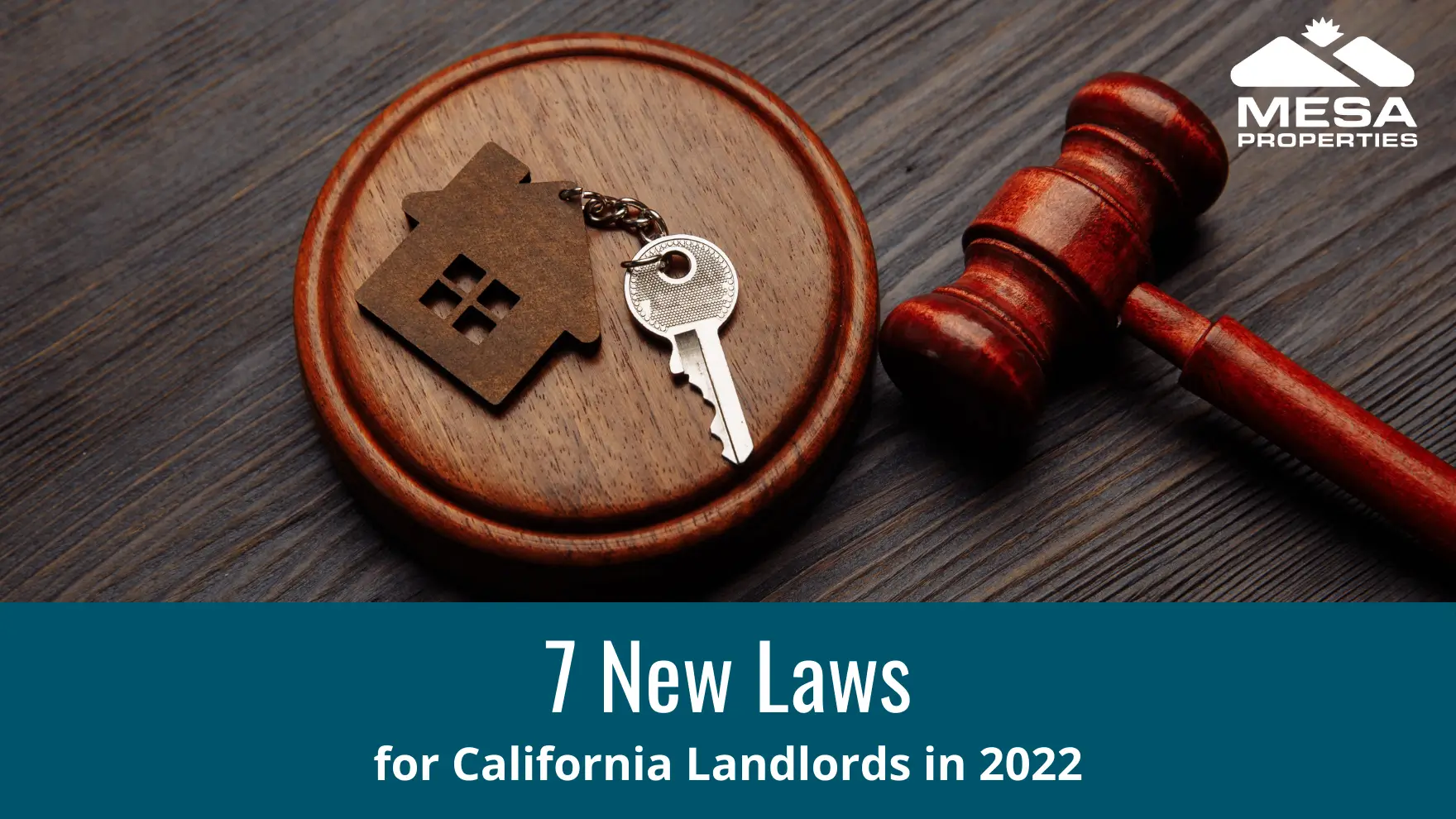It's another new year which means as usual, there are several new laws affecting California landlords. Don't worry though! We will go through all of them to bring you up to speed and help you stay compliant in 2022 and beyond.
COVID-19 Update - AB 3088
If you ask most landlords in California if COVID-19 is still impacting their ability to collect rent or file for eviction if rent is unpaid, they might say no. The eviction moratorium ended back in September, right?
The truth is…more complicated than that.
While yes it is true that the eviction moratorium and the 15 day notice to pay or quit that came with it is now in the past and we are technically back to 3 day notices to pay or quit, the new notice you are supposed to serve is modified pretty heavily.
These new 3 day notices have to be used until March 30, 2022 and give the tenants information about how to apply for rental assistance. You as the landlord are also supposed to apply for rental assistance through the State’s program and then wait 15 days for the tenant to apply before you can file for eviction. So it’s a 3 day notice that requires a 15 day time period before action can be taken. So…not really a 3 day notice.
If there is an active rent relief application in progress and you try to file for eviction, things may get complicated if you are even able to file at all. We recommend consulting a real estate attorney that specializes in evictions for more on that.
There is almost certainly more to come on COVID restrictions around evictions and demand notices this year so be on the lookout for that. We have a detailed article on AB3088 which you can check out for more info on the current rules.
Short Term Rental Updates - SB 60
Everyone, including a local county or city near you, is still trying to wrap their heads around short term rentals.
You know, that neighbor of yours that moved away and decided to AirBnb their place and subsequently subjected the neighborhood to loud parties, blocked driveways and a constant coming and going of out of town visitors seeking an experience they can’t get in a hotel room.
What SB 60 does is drastically increase the penalties for these cavalier landlords who decide to rent out their home for any period less than 30 days in a county or city that has a short term rental ban.
Last year, violating one of these rules may have just been a good business decision because short term rentals can generate quite a bit of cash and the fines were only $100 for the first violation, $200 for the second and $500 for the third and beyond. It’s obvious that many short term landlords saw these fines as simply a “cost of doing business” because they could probably pretty easily offset them with the rental income they were making.
Well, you know the phrase, “make hay while the sun shines” which is what these landlords were doing because the clouds sure have rolled in. These fines have now increased to a whopping $1,500 for the first violation, $3,000 for the second and $5,000 for every violation after that. Not quite as offsetable as last year.
New Mold Lease Disclosure - HSC 26148
Your lease probably wasn’t long enough already so don’t worry! You have more fun stuff to add to it in 2022.
HSC 26148 requires landlords to provide a new booklet with some really delightful pictures called the “Information on Dampness and Mold for Renters in California.”
This has to be provided to tenants before they sign the lease, similar to the Lead Based Paint disclosure that we are all used to by now.
Refuse Disposal Changes - SB 1383
This isn’t a new law but something that was passed back in 2016.
California wants to reduce it’s methane emissions incrementally and 2022 is one of those milestone years where new measures have to be taken to do that.
Reducing methane emissions in the State with the most dairy cows…we won’t go there.
This one applies to multi-family with 5 or more units. Landlords of these types of properties must participate in any local organics recycling collection. Organics bins must be provided for residents to use and a lease addendum should be used to educate residents on this.
Contact your local waste management company for more details.
Habitability Enforcement - AB 838
This law indirectly affects landlords since it doesn’t apply to them necessarily but instead to local code enforcement agencies.
This will definitely affect landlords because if code enforcement is getting involved, the landlord has likely already failed to remedy a potential habitability issue at their property.
This law essentially mandates that the local agency inspect buildings for substandard conditions or lead hazards if a tenant complains that said conditions exist. They must then also notify the landlord and tenant as well as any other affected parties.
If no substandard condition is found, they cannot charge the landlord a fee for the inspection! This is good news. As long as you do your job as a landlord and address habitability issues as they come up, you will never have to worry about this. And if your tenant believes there is a habitability issue and reports you to code enforcement and there really isn’t one, it won’t cost you anything.
Emotional Support Animals - AB 468
Emotional Support Animals (ESA) and service animals continue to be a major source of confusion for landlords and tenants alike.
Most people will use the two terms interchangeably, but they are very different. A service animal has been trained for a specific purpose (think guide dog). An ESA is simply an animal that has been certified as necessary for therapeutic purposes by a certified professional for use by the individual.
This law does not change any rules around whether or not you have to accept ESAs or service animals (you definitely still do), it just places some restrictions on people selling animals and advertising them as ESAs. They must disclose that the animal has not been trained for a specific purpose.
Certified officials must also meet certain standards in order to be able to issue certificates stating that an individual has a need for an ESA.
Criminal Background Checks - All of Us or None v. Hamrick
This is a super interesting bit of case law and continues further the likelihood that it will soon be just about impossible to use criminal background checks at all when screening applicants in California.
Think that sounds crazy? Cities around the country such as Seattle are already implementing bans on criminal background checks when screening applicants.
This particular case came right out of our own backyard in Riverside County where the court ruled that an individual’s date of birth and/or driver’s license number cannot be used when running a search of criminal court records.
These are two of the critical pieces of data needed to obtain accurate records, so there have been state-wide delays in getting criminal backgrounds or at least accurate criminal records.
Our prediction is that the State may never outright ban the use of criminal background checks during the application process but will continue to make it more and more difficult to obtain the records to begin with, potentially to the point where it is too burdensome to even try to get a criminal record. If you are using criminal background checks in California when screening applicants, make sure you are up to date with DFEH’s 2020 rule on that. There are many rules and restrictions on using criminal background checks, but we won’t get into that here since that is enough of a discussion for an entirely new blog post.
Conclusion
The legal landscape in California continues to evolve and become more complicated for landlords to keep up with.
Still trying to make sense of all this and self-manage your property? What are you waiting for? Contact us today to see if we would be a good fit to take that off your plate.
As a disclaimer, we are not attorneys and nothing in this post is meant to be taken as legal advice. Landlords should contact a trusted real estate attorney for any specific questions on any of the laws or regulations mentioned in this post.



